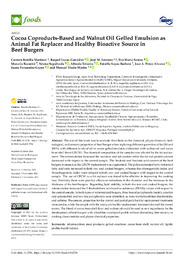Título :
Cocoa Coproducts-Based and Walnut Oil Gelled Emulsion as Animal Fat Replacer and Healthy Bioactive Source in
Beef Burgers |
Autor :
Botella-Martinez, Carmen 
Lucas González, Raquel 
Lorenzo, José M.
Santos, Eva M 
Rosmini, Marcelo
Sepúlveda, Néstor 
Teixeira, Alfredo 
Sayas-Barberá, Estrella 
Pérez-Alvarez, José Angel 
Fernandez-Lopez, Juana 
Viuda-Martos, Manuel  |
Editor :
MDPI |
Departamento:
Departamentos de la UMH::Tecnología Agroalimentaria |
Fecha de publicación:
2021-11-05 |
URI :
https://hdl.handle.net/11000/31796 |
Resumen :
The aim of this work was to evaluate the effects on the chemical, physic-chemical, technological, and sensory properties of beef burger when replacing different quantities of fat (50 and 100%) with different levels of oil-in-water-gelled emulsion elaborated with walnut oil and cocoa bean shell flour (GECW). The chemical composition of the samples was affected by the fat replacement. The reformulation increased the moisture and ash content while the fat and protein content decreased with respect to the control sample. The linolenic and linolenic acid content of the beef burgers increased as the GECW replacement was augmented. The polyunsaturated fatty/saturated fatty acid ratio increased in both raw and cooked burgers, whereas the atherogenicity index and thrombogenicity index were reduced in both raw and cooked burgers with respect to the control sample. The use of GECW as a fat replacer was found to be effective in improving the cooking loss. Similarly, there were positive effects on reductions in the diameter and the increases in the thickness of the beef burgers. Regarding lipid stability, in both the raw and cooked burgers, the reformulation increased the 2-thiobarbituric acid reactive substance (TBARs) values with respect to the control sample. In both types of reformulated burgers, three bound polyphenols (mainly catechin and epicatechin) and two free polyphenols were identified, as were methylxanthines theobromine and caffeine. The sensory properties for the control and partial pork backfat replacement treatments were similar, while the sample with the total pork backfat replacement treatment showed the lowest scores. The blend of cocoa bean shell flour and walnut oil could be used as new ingredients for the development of beef burgers with a healthier nutritional profile without demeriting their sensory or cooking characteristics and physic-chemical properties
|
Palabras clave/Materias:
Reformulation
Meat products
Gelled emulsion
Cocoa bean shell
Walnut oil
Lipidic profile
Health indices |
Área de conocimiento :
CDU: Ciencias aplicadas: Ingeniería, tecnología e industria química. Metalurgia:/ Alimentos y nutrición. Enología. Aceites. Grasas |
Tipo de documento :
info:eu-repo/semantics/article |
Derechos de acceso:
info:eu-repo/semantics/openAccess
Attribution-NonCommercial-NoDerivatives 4.0 Internacional |
DOI :
https://doi.org/10.3390/foods10112706 |
Publicado en:
Foods 2021, 10(11), 2706 |
Aparece en las colecciones:
Artículos Tecnología Agroalimentaria
|
 La licencia se describe como: Atribución-NonComercial-NoDerivada 4.0 Internacional.
La licencia se describe como: Atribución-NonComercial-NoDerivada 4.0 Internacional.
.png)
